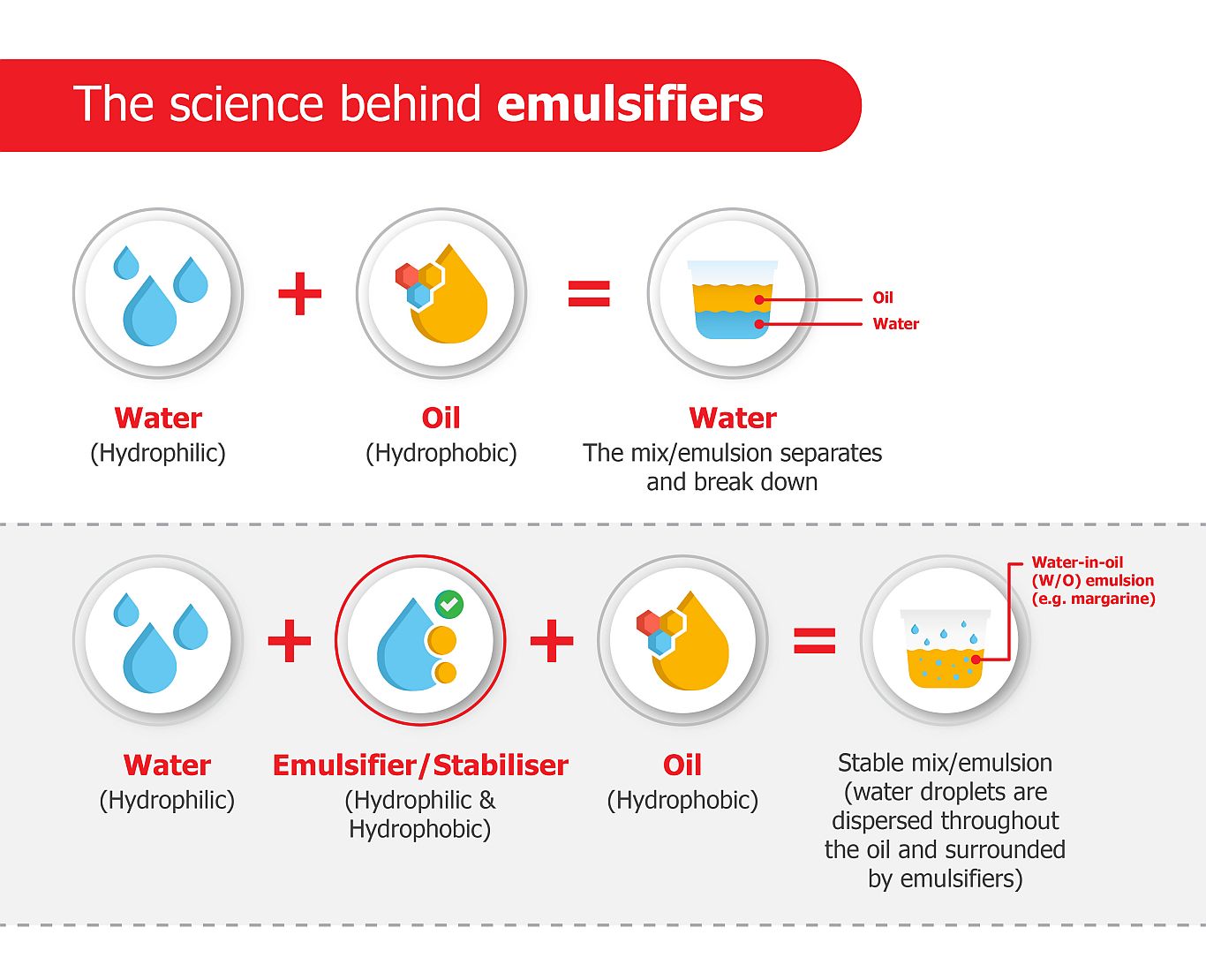Natural vs. Synthetic Emulsifiers: Which Should You Use?
Natural vs. Synthetic Emulsifiers: Which Should You Use?
Blog Article
The Science Behind Emulsifiers and Their Relevance in Modern Production
Emulsifiers play a vital role in modern manufacturing, working as the unsung heroes that mix oil and water for a broad variety of items. You may not realize just how these substances boost structure and stability, however their effect is substantial across industries. As consumer choices change in the direction of cleaner labels, the need for innovative emulsifiers is growing. What does this mean for the future of item formulation? Allow's explore additionally.
What Are Emulsifiers?
Emulsifiers are vital agents on the planet of food and product production, acting as the glue that binds two otherwise immiscible liquids, like oil and water. You could not realize it, but these substances play an important function in producing stable blends. They reduce the surface area tension in between these fluids, allowing them to blend effortlessly. Common examples include lecithin found in egg yolks and soybeans, and mono- and diglycerides made use of in various refined foods.

When you work up a salad dressing or enjoy a luscious treat, emulsifiers help maintain that excellent texture. They assure your products have a constant mouthfeel and appearance, enhancing your total experience. Without emulsifiers, numerous foods would certainly divide, leading to undesirable appearances and flavors. Next time you enjoy a smooth sauce or spread, keep in mind the unsung heroes-- emulsifiers-- that make it all possible.
The Chemistry of Emulsification
When you mix oil and water, you may observe they don't mix easily; that's where the chemistry of emulsification comes into play. To overcome this obstacle, emulsifiers are utilized.
These particles have a hydrophilic (water-attracting) head and a hydrophobic (water-repelling) tail. When you include an emulsifier, its particles place themselves at the oil-water interface, reducing surface area tension and allowing the beads to mix. The emulsifier creates a protective layer around each bead, avoiding them from integrating back right into separate layers. Understanding this chemistry is crucial for achieving stability in products like dressings, lotions, and sauces, making emulsification vital in contemporary production.
Sorts Of Emulsifiers
Different sorts of emulsifiers play vital duties in supporting mixes of oil and water. You'll usually run into 2 major classifications: natural and synthetic emulsifiers. Natural emulsifiers, like lecithin from egg yolks or soy, are acquired from plants and animals, making them popular in food items. They're typically thought about more secure and healthier choices.
On the various other hand, artificial emulsifiers, such as mono- and diglycerides, are chemically crafted to enhance security and service life. They're commonly made use of in processed foods and aesthetic products.
Additionally, you could find non-ionic, anionic, and cationic emulsifiers, each with one-of-a-kind homes that affect their performance. Non-ionic emulsifiers, as an example, job well in a vast array of pH levels, while anionic emulsifiers often tend to perform better in alkaline conditions. Understanding these types can assist you pick the right emulsifier for your certain application.
Mechanisms of Emulsion Development
Comprehending exactly how solutions create is vital for creating stable mixtures of oil and water. When you introduce an emulsifier, it lowers the surface area tension in between the two liquids, enabling them to blend more conveniently.
The emulsifier molecules have a hydrophilic (water-attracting) head and a hydrophobic (oil-attracting) tail. When you include an emulsifier, these molecules organize themselves at the oil-water interface. The hydrophilic heads engage with water, while the hydrophobic tails secure into the oil. This produces a barrier that maintains the beads, stopping them from coalescing.
Applications of Emulsifiers in Numerous Industries
Emulsifiers play a vital function across numerous industries, making your preferred foods smoother and much more delightful. In cosmetics, they improve product appearance and stability, making certain a positive application experience. Plus, in drugs, they assist provide vital active ingredients successfully, boosting total efficacy.
Food Market Makes Use Of
While you may not understand it, emulsifiers play an essential duty in the food sector, improving the structure, stability, and rack life of many items. In baked goods, emulsifiers boost dough handling and retain dampness, resulting in a much better texture and extended quality. By making certain harmony and high quality, emulsifiers are considerable to supplying the delicious items you appreciate every day, making them a crucial component in modern food manufacturing.
Cosmetic Solutions Advantages
When it comes to aesthetic formulas, emulsifiers are important for producing products that really feel glamorous and do efficiently. You'll discover that emulsifiers boost item stability, protecting against separation and prolonging shelf life. Overall, emulsifiers play an important function in supplying high-grade cosmetic products that fulfill your charm demands.
Pharmaceutical Applications Introduction
In the pharmaceutical industry, emulsifiers are important for developing efficient medicines. They help create secure mixtures of oil and water, making sure that energetic ingredients are uniformly dispersed and quickly absorbed by the body. You'll locate emulsifiers in different dosage forms, like lotions, lotions, and fluid suspensions, enhancing the bioavailability of medicines. They also boost the structure and stability of products, making them a lot more attractive and easier to use.
The Effect of Emulsifiers on Item Quality

By making sure secure emulsions, you lower the danger of putridity and prolong rack life, inevitably saving you time and money. You'll additionally find that emulsifiers can boost the bioavailability of active ingredients in your items, making them extra efficient blog here for customers.
Furthermore, they allow you to create cutting-edge solutions that satisfy diverse consumer needs. Whether you're crafting a luscious clothing or a lavish lotion, emulsifiers are vital for attaining the preferred outcomes. In other words, by understanding and leveraging the this content effect of emulsifiers, you can significantly elevate the quality of your products.
Future Trends in Emulsifier Advancement
As the demand for cleaner labels and sustainable products climbs, the growth of brand-new emulsifiers is readied to advance substantially. You'll observe a shift in the direction of plant-based and natural emulsifiers, driven by customer choices for components that are environmentally pleasant and less processed. Innovations in biotechnology will likely enhance the capability and performance of these emulsifiers, enabling producers to create secure formulas with less ingredients.
You could also see an increase in multifunctional emulsifiers that not only support solutions but likewise boost taste, structure, or dietary value. This trend could simplify active ingredient checklists while boosting product efficiency.
In addition, with advancements in nanotechnology, emulsifiers could be crafted at the molecular level to accomplish unprecedented security and efficiency. Emulsifiers. As you explore these trends, you'll discover that the future of emulsifier growth is not almost performance, however likewise concerning accepting sustainability and openness in ingredients
Often Asked Inquiries
Are Emulsifiers Safe for Consumption in Food Products?
Yes, emulsifiers are typically secure for usage in foodstuff. They've been extensively examined and approved by food safety and security authorities, so you can appreciate your preferred foods without bothering with their influence on your health.
Can Emulsifiers Be Derived From Natural Resources?
Yes, you can derive emulsifiers from all-natural resources. Components like lecithin from egg yolks or soybeans and casein from milk prevail. These natural emulsifiers see this here help maintain mixes without synthetic additives, making them popular in different products.

How Do Emulsifiers Affect Life Span of Products?
Emulsifiers support mixes, stopping splitting up and putridity - Emulsifiers. By keeping harmony, they prolong items' life span, ensuring freshness and top quality. You'll see that emulsifiers aid maintain your favored foods and cosmetics carrying out more than time
What Are Prospective Adverse Effects of Emulsifiers?
You may experience digestive issues when consuming items with emulsifiers, as they can interfere with gut germs. Some research studies recommend prospective links to inflammation or allergies, but more study is required to totally understand these effects.

Are There Alternatives to Traditional Emulsifiers?
Yes, there are alternatives to traditional emulsifiers. You can explore alternatives like natural gums, starches, or lecithin. Each alternate offers distinct homes, so experiment to locate what works best for your specific application.
Report this page